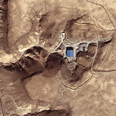
Alleged reactor site
צילום: דיגיטל גלוב, מתוך אתר ה"ניו יורק טיימס"
UN: Syria may have buried nuclear traces
IAEA investigators suspect Damascus may have ordered traces of alleged reactor bulldozed, covered with concrete after Israel bombed site in order to hide evidence of nuclear activity – causing UN probe to come up empty-handed
UN investigators believe Syria may have buried under concrete traces of what Washington suspects was a covert nuclear reactor at a site bombed by Israel a year ago, diplomats said on Sunday.
The International Atomic Energy Agency began probing Syria in April based on US Intelligence suggesting a remote desert complex targeted by Israel was a reactor almost completed with North Korean help and designed to make plutonium for atom bombs.
Satellite pictures indicated Syria swiftly bulldozed the area, removed debris and erected a new building in a possible cover-up, US nuclear analysts say.
Syria has denied hiding nuclear activity from the UN watchdog and said the bombed site at al-Kibar was an ordinary military building. It gave IAEA inspectors access in June.
Partial results of environmental swipe samples showed no traces of carbon or maraging steel, an especially strong alloy of the metal, that would have indicated a graphite reactor, diplomats familiar with the inquiry told Reuters.
The diplomats said Syria has rebuffed IAEA requests to revisit al-Kibar and examine three military sites seen as interlinked, citing grounds of national security.
Full test results from the June mission may not be available until November and may not prove conclusive either, they said.
US intelligence indicated the reactor had not begun to process material before Israel's attack, so there would have been no radioactive material to detect.
"This doesn't mean there was nothing there, just that the inspectors did not (or could not) search the right places," said a senior Vienna diplomat versed in the matter.
"Syria laid a big slab of concrete over it (ground where the alleged reactor stood) after digging a hole. Ideally the IAEA should be able to examine the chunks of debris but the feeling is that the Syrians may have dumped all of it down the hole.
Inconclusive results
IAEA Director Mohamed ElBaradei, opening a regular meeting of the agency's 25-nation board of governors on Monday, was expected to say the Syria inquiry remained inconclusive and inspectors needed more cooperation from Damascus.
Unlike Iran's disputed nuclear work, Syria was not on the board's official agenda because inspectors, lacking substantive findings, submitted no written report for debate.
Still, the United States and Western allies were expected to call in statements for Syrian transparency and full cooperation.
ElBaradei has rebuked the United States and Israel for not alerting the IAEA of their suspicions before the bombing, saying a "shoot first and asking questions later" approach would make it much harder for the UN watchdog to establish the truth.
A European diplomat said Syria's tough posture and slowness reacting to requests for access reminded some of ally Iran's stonewalling of IAEA probes into whether Tehran has tried to adapt explosives and missile cones for nuclear weapons.










